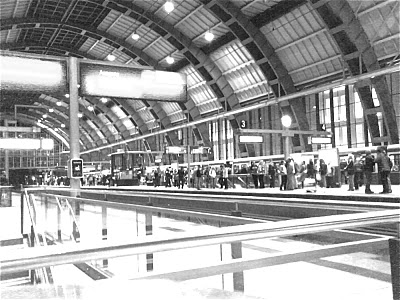Bahnhof Alexanderplatz
Berlin scares the hell out of me, a Parisian friend confesses on a weekend visit. Putain! Look how empty the streets are! Now and again there’s a bar full of people, but Berlin usually reminds me of the provinces.
Low blow.
But there are plenty of people, I assure him. You just can’t see them.
His eyes grow wide. Now he’s really afraid.
No, no, let me explain. There are just as many people here as in Paris (well, inside the périphérique), but they’re spread over eight times the surface area. The city is depopulated.
He nods. Yes, I can see that.
His eyes glaze over as I provide a historical explanation and talk about World War Two, death and destruction and bombing, exodus during division, the departure of East-Berlin jobseekers after the fall of the Wall, the dismantling of GDR industry, unemployment… And I tell him, earnestly, that Berlin now has all the cultural advantages of a world capital, except it’s low stress, and there are lots of parks. Yes, here you can breathe!
He looks as unconvinced as Frank O’Hara when he wrote: ‘I can’t even enjoy a blade of grass unless I know there’s a subway handy, or a record store or some other sign that people do not totally regret life’.
I should have bundled him right then and there onto the East-West S-Bahn train line, the platforms of Friedrichstraße, or the tunnels under Alexanderplatz. When I miss that New York rush (that day after day degraded my quality of life, in the never-dark-and-never-quiet Big Apple), I come here to feel the whirr of humanity. There’s a constantly changing canvas of population moving between metro lines to disparate parts of the city, a portrait of its inhabitants who are so often are atomised.
The low ceilings, uplit with squat light boxes reference the adjacent Berolinahaus (1929), create the necessary claustrophobia. Crowds pour at intervals from three U-bahn lines, the S-Bahn, and rail lines, to provide the rush. Upstairs, through the barrel-glass roof over the tracks, there is a vision of the big city, the relief of space. Watch passing trains, destination Warsaw, destination Moscow. Look at the view to dense Communist blocks through the partitioned glass, the disappearing trunk of the radio tower. Alexanderplatz feels like nostalgic science fiction: a vision of a metropolis conjured by the Jetsons, the future realised in the past.
This was once a ghost platform, one of those forbidden zones where Western trains nipped briefly under the Eastern half of the city but did not stop, unloading passengers only when back in the West. Now, an Ossie in his faded jeans and buzz-cut can compare mobile phones with a group of Neukölln-bound Turkish-speaking teenagers. The train on the opposite platform unloads, you can feel strangers brushing by you, a moment of accidental contact. Tourists up early for the museums mix with clubbers on their way back home. There is the smell of soap, and liquor. The all-nighters slump waiting in their seats, move with deliberation up the escalators, and speed-swallow kebab. A couple, pressed against a column under the panel that counts diminishing minutes for the next train, really should find a room. A workman eyes them as he puts on another coat of glue on a panel for an advertisement across the tracks. A shopper cuts someone off on the escalator. And I hear someone curse. It happens just once, and is followed by that habitual silence of Germans-in-transit, a quiet that will strike you as either creepy or civilised.





"When I miss that New York rush (that day after day degraded my quality of life, in the never-dark-and-never-quiet Big Apple), I come here to feel the whirr of humanity."
Yes, that's an interesting phenomenon. I felt the same way after leaving London: I never enjoyed the place, but at some level I missed the stress and rush of it all. It seems to reassure us that we're living in a node of the world that has importance, and there's a meta-level stress that comes from having a much lower quantity of ordinary stress on a daily basis, as though we've retired too early and have failed to endure the requisite quantity of pain that ought to be commensurate with achievement.
Great work! Brings back many great memories of Berlin! Thank you and happy new year!
Will you also be visiting the Bendler Block? I found my visit there to be very moving. Also, the Russian museum in Karlshorst was insightful.
best,
simon
'When I miss New York…'. Except, of course, that the public transport works beautifully in Berlin. PLLP!
@Ceri: I feel that longing only when I am not actually in a place with a high level of stress!
@Simon: Good advice, thank you!
Whenever I read your blog, I connect with something. This time I'm interested in what would seem to be "clashing". Quiet travelers, yet hectic. Busy city full of life, yet quiet and empty. And most of all while looking at the pictures, I'm in awe of the old, industrial looking places and shops, while right next to a wall covered in the most amazing and beautiful art of taggers. What a pleasure! Carolyn…